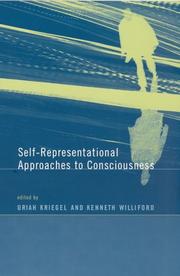| Listing 1 - 3 of 3 |
Sort by
|
Book
ISBN: 1299452272 0199720525 9780199720521 9780199932191 0199932190 Year: 2013 Publisher: New York : Oxford University Press,
Abstract | Keywords | Export | Availability | Bookmark
 Loading...
Loading...Choose an application
- Reference Manager
- EndNote
- RefWorks (Direct export to RefWorks)
Phenomenal intentionality is supposed to be a kind of directedness of the mind onto the world that is grounded in the conscious feel of mental life. This book of essays explores a number of issues raised by the notion of phenomenal intentionality.
Book
ISBN: 0190273240 0190238356 0199846138 9780199846139 9780190238353 9780199846122 Year: 2015 Publisher: New York : Oxford University Press,
Abstract | Keywords | Export | Availability | Bookmark
 Loading...
Loading...Choose an application
- Reference Manager
- EndNote
- RefWorks (Direct export to RefWorks)
How many types of sui generis, irreducible, basic, primitive phenomenology do we have to posit to just be able to describe the stream of consciousness? This book offers a first general attempt to answer this question in contemporary philosophy. It develops a unified framework for systematically addressing this question and applies it to six controversial types of phenomenal experience, namely, those associated with thought and judgment, will and agency, pure apprehension, emotion, moral thought and experience, and the experience of freedom.

ISBN: 1282100866 9786612100864 026227762X 142947758X 0262311631 9780262277624 9780262112949 0262112949 9780262612111 0262612119 9781429477581 Year: 2006 Publisher: Cambridge, Mass. : MIT Press,
Abstract | Keywords | Export | Availability | Bookmark
 Loading...
Loading...Choose an application
- Reference Manager
- EndNote
- RefWorks (Direct export to RefWorks)
In this pioneering collection of essays, leading theorists examine the self-representational theory of consciousness, which holds that consciousness always involves some form of self-awareness. The self-representational theory of consciousness stands as an alternative to the two dominant reductive theories of consciousness, the representational theory of consciousness (RTC) and the higher-order monitoring (HOM) theory, combining elements of both RTC and HOM theory in a novel fashion that may avoid the fundamental deficiencies of each. Although self-representationalist views have been common throughout the history of both Western and Eastern philosophy, they have been largely neglected in the recent literature on consciousness. This book approaches the self-representational theory from a range of perspectives, with contributions from scholars in analytic philosophy, phenomenology, and history of philosophy, as well as two longer essays by Antonio Damasio and David Rudrauf and Douglas Hofstadter. The book opens with six essays that argue broadly in favor of self-representationalist views, which are followed by five that argue broadly against them. Contributors next consider connections to such philosophical issues as the nature of propositional attitudes, knowledge, attention, and indexical reference. Finally, Damasio and Rudrauf link consciousness as lived with consciousness as described in neurobiological terms; and Hofstadter compares consciousness to the "strange loop" of mathematical self-reference brought to light by Gödel's incompleteness theorems. Contributors:Andrew Brook, Peter Carruthers, Antonio Damasio, John J. Drummond, Jason Ford, Rocco J. Gennaro, George Graham, Christopher S. Hill, Douglas R. Hofstadter, Terry Horgan, Tomis Kapitan, Uriah Kriegel, Keith Lehrer, Joseph Levine, Robert W. Lurz, David Rudrauf, David Woodruff Smith, John Tienson, Robert Van Gulick, Kathleen Wider, Kenneth Williford, Dan Zahavi.
Consciousness. --- Mental representation. --- Representation, Mental --- Abstraction --- Perception --- Apperception --- Mind and body --- Philosophy --- Psychology --- Spirit --- Self --- COGNITIVE SCIENCES/General --- PHILOSOPHY/Philosophy of Mind/General
| Listing 1 - 3 of 3 |
Sort by
|

 Search
Search Feedback
Feedback About UniCat
About UniCat  Help
Help News
News